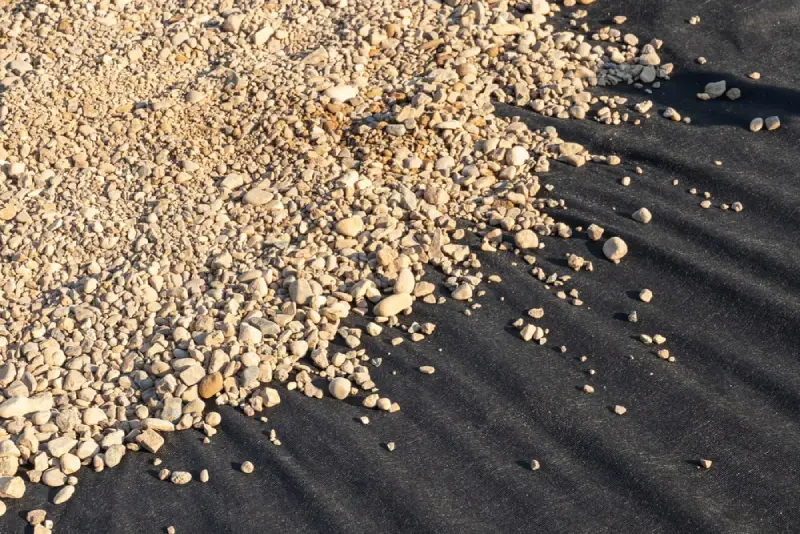
The Grounds Guys provides a guide on installing landscape fabric under rocks to enhance garden aesthetics and functionality.
|
Have you been thinking about giving your lawn a makeover? Using rocks in your landscape is an excellent way to highlight certain features and beautify your yard. Stones add contrast and texture and stand the test of time. They also hold up well in various weather conditions and can withstand plenty of foot traffic, which makes them an ideal option for homeowners looking to add low-maintenance features. Also, water can drain more gradually into the ground through rocks and stones, so the soil has more time to absorb it, reducing the risk of runoff and ground erosion.
Whether you’d like to create a stone garden or a gravel pathway, consider installing landscape fabric for rocks. This is a sheet-like covering that can be made of linen, polypropylene, polyester, or recycled materials, and there are many benefits to using it for landscaping projects.
If you’re not sure how to install landscape fabric under rocks, you’ve come to the right place. We’ve crafted an easy-to-follow guide to help explain the purpose and process of installing landscaping fabric underneath rocks so your ideal stone landscape is within reach!
Table of Contents:
What Is the Purpose of Landscape Fabric?
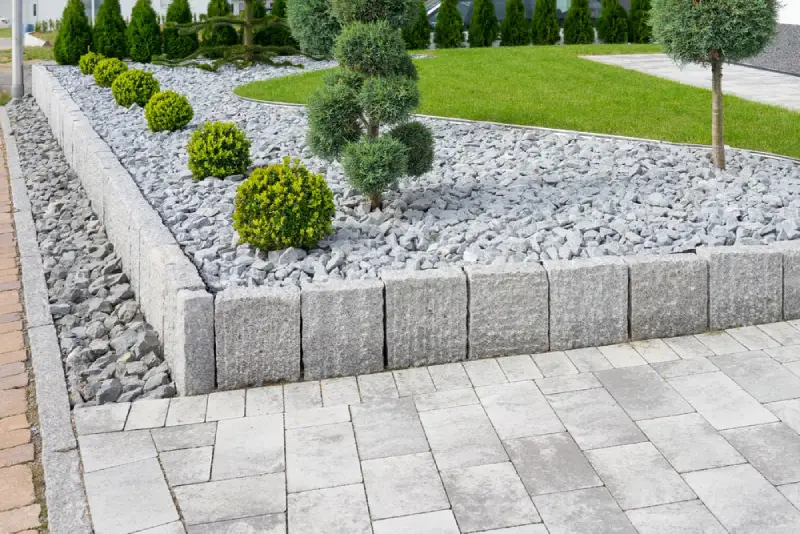
Landscaping fabric can be perforated, spun, woven, or non-woven. It comes in rolls, so you can easily spread it around where you want it placed.
Woven landscape fabric is usually made from polypropylene or linen material and is often used around trees and shrubs. Perforated and woven fabrics are both ideal for use in vegetable gardens or flower beds, as their small holes allow water, moisture, nutrients, and oxygen to reach the soil. However, the best landscape fabrics for rocks are non-woven or spun.
Here are some of the primary benefits of placing landscape fabric under rocks:
- Creates a barrier to prevent rocks from sinking into the soil.
- Keeps air and water flowing, minimizing drainage issues.
- Helps prevent weeds from growing between stones for about two years.
- Effectively controls ground erosion from wind and rain.
- Reduces evaporation, which helps retain soil moisture for nearby plants and trees.
- Makes it easier to remove and reposition stones as needed.
Along with the many benefits, laying down landscape fabric is a relatively simple task that can save you time and effort in the long run. Proper preparation for the project is essential, though. You’ll need to have the right type and size of fabric, along with the necessary tools, to make sure you do the job correctly.
Selecting Landscape Fabric and Gathering Tools for Installation
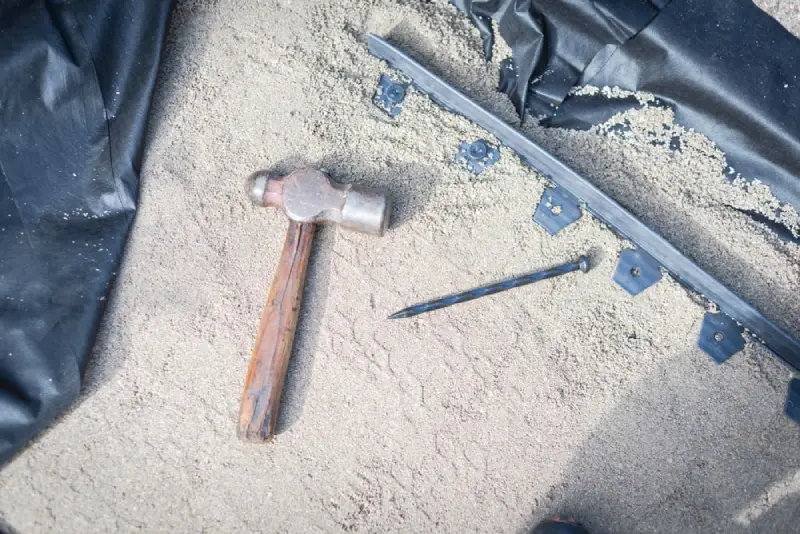
Non-woven fabrics are suitable for adding stability and blocking weeds under stones. If you’re creating a gravel pathway, rock gardens, or using it in areas where you won’t need to water often, non-woven fabric works best. Spun landscape fabric is a good choice for placing underneath pathways, gravel mulches, and even behind retaining walls.
You can purchase landscape fabric for rocks at most home improvement, hardware, and garden supply stores. Before you make a purchase, measure the area you’ll be covering to ensure you won’t run out of fabric. It’s not fun to have to make a second trip to the store in the middle of an installation project. You can always get a refund for any unopened packages.
Along with your landscape fabric, you’ll need to gather stones and the right tools. If you plan to use larger stones, adding a small amount of gravel protects the fabric and keeps the layer thin. Note: soft, rounded stones work best as they won’t puncture or rip the landscape fabric. If you plan to install heavier stones, enlist the help of a friend or family member. The additional set of hands will come in handy (no pun intended).
Other tools and supplies you’ll need to install landscaping fabric under rocks include the following:
- A bow rake
- A garden hoe
- Scissors or utility knife
- A hammer or rubber mallet
- Landscape staples
- Edging materials (e.g., metal, wood, plastic, brick, etc.)
Once you have your fabric, stones, tools, help, and other materials, it’s crucial that you prepare the area to ensure good results.
Preparing the Landscape
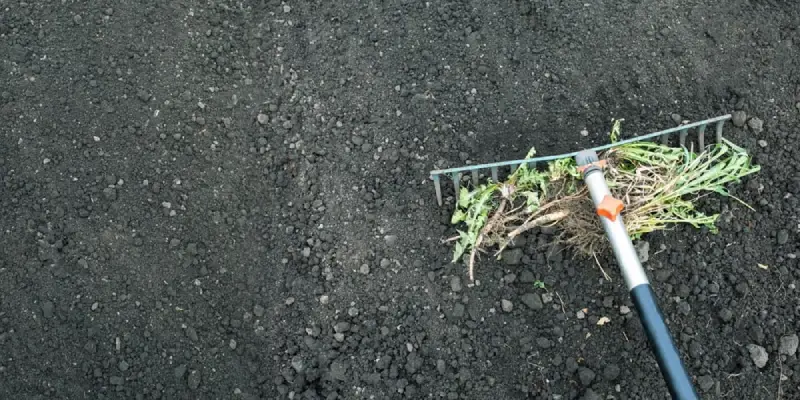
The first thing you’ll need to do is remove any existing weeds from your landscape. You can pull them out by hand, hoe, or another method. Be sure to remove them from their roots to keep them from growing back. You can use an herbicide, but be careful not to spray nearby plants or grass.
When the weeds are out of the way, use a rake to remove excess sticks, rocks, bark, and other debris. Then scrape away any mounds or high areas in the soil with the rake. The goal is to create a flat, tight area to lay the fabric over the ground. Also, be sure to fill in any holes or areas where the ground is lower. It’s best to start with a level surface.
If your soil looks like it needs a little extra care, add soil amendments, such as compost and fertilizer.
Installing Landscape Fabric
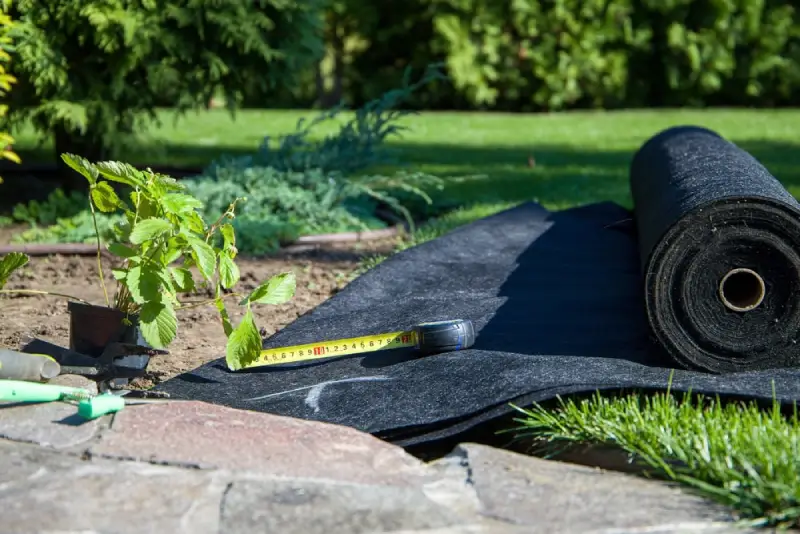
Start at the area you wish to cover and roll out the first sheet of landscape fabric. Cut the fabric you’ll use with a utility knife. Then roll out and overlap the remaining sheets. Doing this ensures that the site has no gaps or exposed soil. If you plan to add any existing plants to the site, use your utility knife to cut an “X” into the fabric.
Next, fix the fabric into the ground with the landscape staples. Drive the staples (or nails) in the ground with a mallet or hammer every 8 to 12 inches or so along the edges of the fabric.
Creating a Stone Landscape
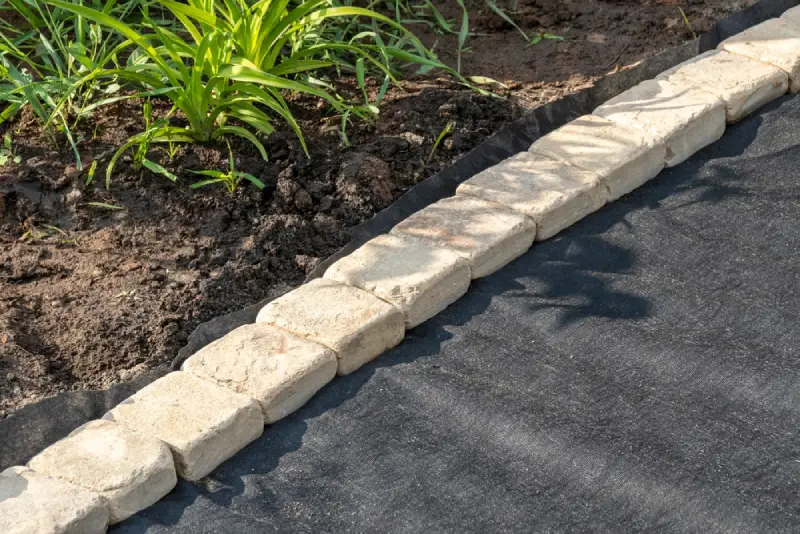
Before you lay the stones over the fabric, install the edging you selected to create a border around them. Tuck the fabric underneath the edging, and then lay out the rocks or stones you want to use. Layer the rocks and add a little bit of gravel to protect the landscape fabric. Rake over the stones to ensure that they are distributed evenly. Make sure there are no spots where you can see the fabric.
Start Your Landscape Fabric Project Today!
Now that you know how to lay landscape fabric properly, you’re on your way to enjoying the beauty and benefits of landscaping with rocks. If you have questions about landscape fabric for rocks, contact The Grounds Guys® nearest you. Our experts are happy to help with landscape fabric installation and all of your lawn care and landscape needs.
We offer an extensive range of services to keep your property looking its absolute best all year round. And all our work is backed by the Neighborly Done Right Promise®, which guarantees your satisfaction. Contact us today! We’ll be happy to provide you with a free estimate.
Landscape Fabric FAQs
As an industry leader, The Grounds Guys are committed to using our 20+ years of landscape knowledge and experience to help bring the vision for their property to life. This includes answering your questions about landscape and lawn care services. Below are answers to some of the most frequently asked questions about installing landscape fabric underneath rocks.
Can I install landscape fabric over weeds or grass?
No, you should never install landscape fabric directly over weeds or grass. You must remove all weeds and create a level surface before installing landscape fabric.
Why you should remove weeds or grass before installing landscape fabric:
- Existing weeds can push through or around the fabric, defeating its purpose
- Grass underneath will decompose and create uneven surfaces that cause landscape rocks or anything else you install to shift
- Organic matter beneath the fabric can attract insects and create drainage problems
Proper preparation steps: Remove all weeds from their roots using hand-pulling, hoeing, or herbicide application. Clear away grass by cutting it at soil level or using a sod cutter for larger areas. Once the area is completely cleared, rake the soil smooth and level before laying your landscape fabric. This foundation ensures your landscape rocks stay in place and helps weeds remain blocked.
Taking time for thorough preparation prevents costly do-overs and ensures your rock landscaping project looks professional and lasts longer.
Does landscape fabric need to be replaced?
High-quality landscape fabric typically lasts 3-5 years under landscape rocks, though replacement timing depends on several factors including fabric type, weather exposure, and foot traffic.
Signs your landscape fabric needs replacement:
- Weeds growing through or around the fabric
- Visible tears, holes, or degradation of the material
- Landscape rocks sinking into the soil below
- Water pooling on the surface instead of draining through
Factors affecting longevity: Non-woven and spun fabrics used for rock landscaping generally last longer than woven varieties. UV exposure, freeze-thaw cycles, and heavy foot traffic can accelerate wear. Areas with acidic soil or excessive moisture may require more frequent replacement.
Extending fabric life: Choose commercial-grade, UV-resistant fabric for better durability. Ensure proper installation with adequate overlap and secure fastening. Add a thin layer of sand or small gravel between the fabric and larger landscape rocks to prevent puncturing.
Regular inspection helps you catch problems early, and replacing worn sections promptly prevents weeds from re-establishing in your rock landscaping.
Should I use pins or staples to secure the fabric?
Landscape staples are the preferred choice for securing fabric under landscape rocks. While both pins and staples can work, staples offer superior holding power and durability for rock landscaping projects.
Why landscape staples work better than pins:
- Stronger grip: U-shaped design distributes pressure across more fabric surface area
- Better penetration: Wider profile stays secure in various soil types
- Professional results: Less likely to pull through fabric under the weight of landscape rocks
- Easier installation: Standard size fits most hammers and mallets
Proper landscape staple installation technique: Drive staples every 8-12 inches along fabric edges and seams using a rubber mallet or hammer. For areas with heavy landscape rocks, space staples closer together (every 6-8 inches). Ensure staples sit flush with the fabric surface to prevent snagging.
When pins might be appropriate: Fabric pins work for temporary installations or very lightweight applications, but they're not recommended for permanent rock landscaping projects. The smaller contact area makes them more likely to pull through under stress.
Quality landscape staples cost slightly more than pins but provide the secure foundation your landscape rocks need to stay properly positioned for years.
This article is intended for general informational purposes only and may not be applicable to every situation. You are responsible for determining the proper course of action for your home and property. The Grounds Guys are not responsible for any damages that occur as a result of this blog content or your actions. For the most accurate guidance, contact The Grounds Guys location nearest you for a comprehensive, on-site assessment.